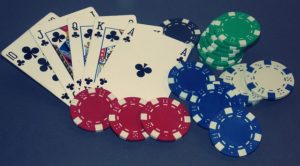Poker is a game with many different variations and styles. You can play for fun or money. Some people are lucky enough to win at the table every time they sit down, while others have to work hard at it. Some people even cheat to win the game. Many people often ask, how can you cheat in poker? With different poker cheating devices available, you can easily cheat in poker. To win in poker, you don’t need to always cheat. You also need to learn some strategies that can help you in the game.
Know Your Opponents
 It is important to know what you are up against at the poker table. This includes knowing how each person plays and if they tend to bluff or not, when they do it most often, etc. This can help you make more educated guesses about their poker hands. You can do this by observing your opponents and paying attention to their actions, such as when they bet.
It is important to know what you are up against at the poker table. This includes knowing how each person plays and if they tend to bluff or not, when they do it most often, etc. This can help you make more educated guesses about their poker hands. You can do this by observing your opponents and paying attention to their actions, such as when they bet.
Learn From Your Mistakes
Stop making costly mistakes at the table! Review your play after each hand to determine what went wrong, then practice how to avoid those same blunders next time. Once you know what kind of mistake it causes you problems (like playing too many hands or not betting when you should), make a point of focusing on your strategy and try to avoid doing the same thing again.
Establish a Starting Hand
Each poker game has its unique mix of starting hands that you should play. Before playing, make sure to review what kinds of cards are required before declaring a hand and wanting to begin the betting process (this is different for each type of poker). Once you know which types of hands you generally like, create your own personal table to track them. This will help you know when to fold, call or raise in the future.
Read Peoples Body Language
 In the game of poker, you must know when someone is bluffing and when they aren’t. People tend to fidget, look away or blink more often if they try not to show their hand. If you can recognize that your opponent isn’t being honest with you, you have a big advantage. In fact, this is how many professional poker players make their living – by knowing when someone is bluffing and how to determine what the real cards are. Do not let your own feelings interfere with you making good decisions at the card table. This may sound simple, but it can be harder than it sounds if you get emotionally invested in a particular game. As you can see, there are many strategies to consider when playing poker. It is important that you understand all of these nuances and how they might affect your game before sitting down at a table with real money on the line.
In the game of poker, you must know when someone is bluffing and when they aren’t. People tend to fidget, look away or blink more often if they try not to show their hand. If you can recognize that your opponent isn’t being honest with you, you have a big advantage. In fact, this is how many professional poker players make their living – by knowing when someone is bluffing and how to determine what the real cards are. Do not let your own feelings interfere with you making good decisions at the card table. This may sound simple, but it can be harder than it sounds if you get emotionally invested in a particular game. As you can see, there are many strategies to consider when playing poker. It is important that you understand all of these nuances and how they might affect your game before sitting down at a table with real money on the line.
For more information on any strategy or a full overview of what it takes to be an effective player, please reach out for consultation services. Some people will sit down with you and go over everything from basic hands to high-level concepts to help ensure that your next match goes as planned.
